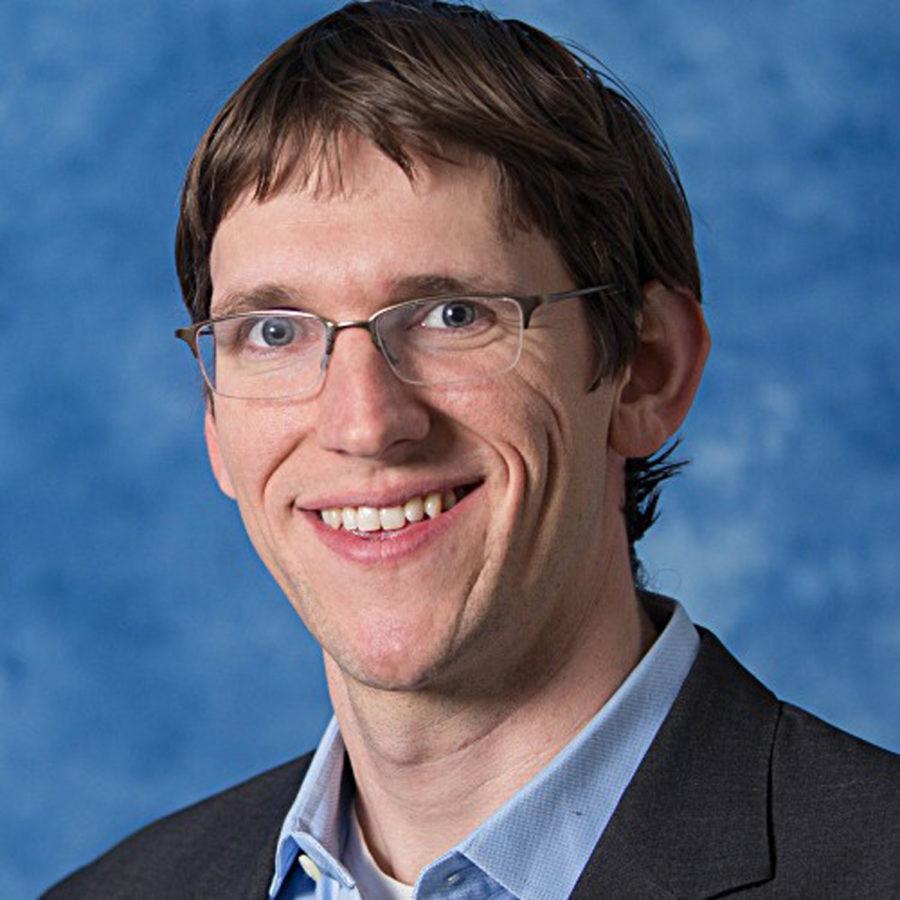Engineering professor receives NSF CAREER Award
Image via University of Pittsburgh
Professor Tevis Jacobs, an assistant professor in the mechanical engineering and materials science department, received the National Science Foundation’s $500,000 CAREER Award to improve nanoparticle performance.
April 4, 2019
When a bowling ball is placed against the wall with nothing to support it, it falls immediately toward the ground. But Tevis Jacobs, an assistant professor in the mechanical engineering and materials science department, continues to think about how a bowling ball — or any object, really — that is more than a million times smaller than normal could stick to the wall and not fall immediately. Fortunately, he received the means to continue the research needed to understand why.
Jacobs received the National Science Foundation’s $500,000 CAREER Award this year to improve nanoparticle performance. Jacobs plans to work with his Surfaces and Small-Scale Structures Laboratory to advance the understanding of micro- and nano-surfaces and their changing properties in order to engineer more stable nanoparticles.
The NSF describes the CAREER Award as a prestigious grant that is “in support of early-career faculty who have the potential to serve as academic role models in research and education and to lead advances in the mission of their department of organization.” Jacobs said his previous work prepared him for the grant for the CAREER Award.
“In my grant,” Professor Jacobs explained, “I mentioned what I was going to do in the five years and then the 10 years or 15 years total. Forces you more than a typical award to do that planning. Helps you to think bigger.”
Thinking bigger is exactly what Jacobs did as he began his research. Now, sitting in his fifth floor office of Benedum Hall, Jacobs explained the research he and his laboratory staff will conduct with the grant. Some may already know about nanoparticles, but the question that remains for Jacobs to answer is how researchers can prevent the advantageous properties from decaying over time.
“The properties of nanoscale materials are fundamentally different. It is not that you can just fit more in. Some people think it is like if I want to put a device in the body,” Jacobs said. “Well, if I make it smaller, it will be less intrusive. That’s a benefit, but that is scratching the surface. The real benefit is that if you make things smaller, the properties change.”
Jacobs will specifically use tools provided through the Swanson School of Engineering, such as an electron microscope, to directly measure the change in these properties under different circumstances.
“These measurements will enable greater understanding of the atomic-scale relationships between nanoparticle adhesion and coarsening,” Jacobs said.
Coarsening is the process of the unstable particles growing bigger spontaneously. This can mean that the researcher is left with a 10-nanometer particle rather than the designed two-nanometer particle. By solving the problem of coarsening, Jacobs will be able to prevent nanoparticles properties from degrading over time, thus making them more stable and able to provide those benefits for a longer time period.
Jacobs is tackling the phenomenon of nanoparticle adhesion with the support and help of both Ph.D. students and other faculty members.
One such student is fourth-year Ph.D. student of Jacobs, Sai Bharadwaj Vishnubhotla. For the work specific to the grant, Vishnubhotla finds himself in the laboratory looking at nanoparticles and examining their mechanical properties.
“For this research, we are trying to understand how these nanoparticles attach to surfaces,” Vishnubhotla said. “So my contribution is mainly in designing the experiments and trying to measure these properties through electron microscopy.”
Along with the research component of the grant, the CAREER award will allow Jacobs and his laboratory to work with the University’s School of Education and local elementary schools to develop surface engineering-focused curricular units. Their work with the School of Education will focus primarily on tailoring their curriculum to fourth- through sixth-grade students. Jacobs hopes to work toward closing the gender and racial gap in STEM education.
“Two national priorities are getting more people in STEM education, just increasing the number. But also, improving the representation. We all know that there is a gender gap in STEM education. We also know that there are various ethnicity gaps,” Jacobs said. “So we are focusing on increasing the number of people in STEM, but then also specifically focusing on the gender gap.”
Yahui Yang, a fourth-year Ph.D. student in the chemical engineering department, works with a collaborator on the grant, Goetz Veser. Like Jacobs, Yang believes through her own time in the lab that first-hand experience is the best way for a student to learn.
“I think that is more straightforward for students to understand what’s happening,” Yang said. “I sometimes give tours for high school students and I just walk them through some of the equipment in the lab and I think it is easier for them to understand rather than a science poster that can be very abstract.”
Jacobs said he is excited to take on the task of working with nanoparticles and their changing properties — especially the research and education components.
“When we talk about nanoparticles, even I, as a scientist that studies nanoscience, have trouble conceiving of how small these are,” Jacobs said. “I am very excited about both [components]. They are both huge endeavors.”
This story has been updated to better reflect the underlying science of the nanoparticle research.








